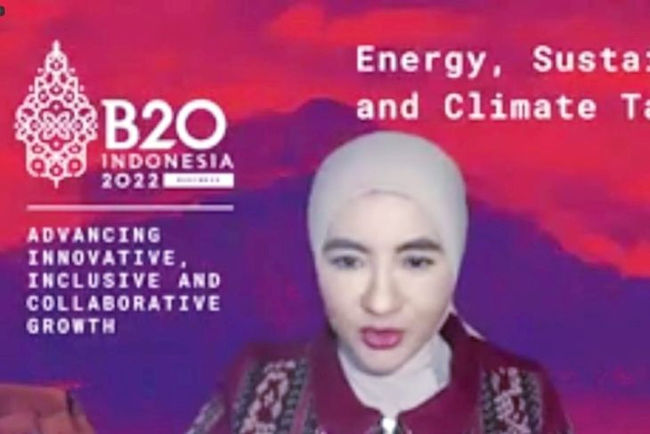The energy transition process must take place in order to maintain sustainability, chair of the Energy, Sustainability, and Climate Business 20 (TF ESC-B20) Task Force, Nicke Widyawati, has said.

During a “BloombergNEF (BNEF) Net Zero Summit” discussion initiated by the Coordinating Ministry for Maritime Affairs and Investment and the Asia Natural Gas and Energy Association (ANGEA), Widyawati, who is also the CEO and president director of state-owned energy company Pertamina, said that the energy transition process is a part of B20 activities.
During the discussion, she emphasized that the energy transition cannot be achieved in a short time.
“The process requires various kinds of technology, costs, and human resources that can reach the standards of renewable energy,” she explained.
When the energy transition process occurs, the demand for energy will also increase, she pointed out. Thus, energy security on a large scale will need to be maintained.
Widyawati then described several strategies carried out by Pertamina to overcome the challenges faced in balancing efforts to realize the energy transition for sustainability, including net zero emissions, with measures to maintain energy security.
“To achieve net zero emission (NZE) aspirations while maintaining energy security in Indonesia, Pertamina has developed some comprehensive strategies that are delivered through two main pillars and three medium-term strategies,” she informed.
The two main pillars are focusing on decarbonizing business activities and assets and developing new renewable green energy businesses.
Meanwhile, the first of the three medium-term strategies carried out by Pertamina to support NZE realization involves developing its carbon accounting standards to meet national and international standards.
The second strategy involves stakeholder engagement to fully support the achievement of national NZE targets, which will be supported by the company’s long-term investments.
The third strategy involves the company’s environmentally friendly sustainability business initiatives that will focus on biofuels, renewable energy sources, carbon capture storage (CCS/CCUS), batteries and electric cars, hydrogen, as well as self-sustaining carbon businesses.
Moreover, Pertamina has also developed a strategy to support the energy transition by allocating its capital expenditure (capex) for low emission energy and developing new renewable energy (NRE).
“We have set a goal to increase the green business portion in Pertamina’s revenue, which is from 5 percent in 2022 to 13 percent by 2030,” Widyawati said while providing details on the company’s share of capital costs for green energy.
The company has also predicted that its fossil fuel revenues will decline significantly from 86 percent in 2022 to 66 percent by 2040.
Furthermore, she highlighted that the goal of optimizing the capital allocation for green businesses has been coordinated by Pertamina with the government to ensure that the measures taken align with the national energy mix target for new renewable energy.
To balance financing, Pertamina has also made a long-term investment strategy, which has included the allocation of 14 percent of its capex for green energy business activities.
In addition, the company will continue to invest in fossil fuels and petrochemicals as the backbone of its current business in an effort to ensure that the energy transition process does not disrupt energy security.
Apart from the capital investment strategy, Pertamina is also collaborating with various parties to accelerate the achievement of green energy targets.
Contact: Heppy Wulansari, Pjs. Vice President Corporate Communication, PT Pertamina (Persero)
Mobile: +62 811-296-949, Email: heppy@pertamina.com, URL: https://www.pertamina.com
Written by: Yuni Arisandy Sinaga, Editor: Sri Haryati (c) ANTARA 2022
